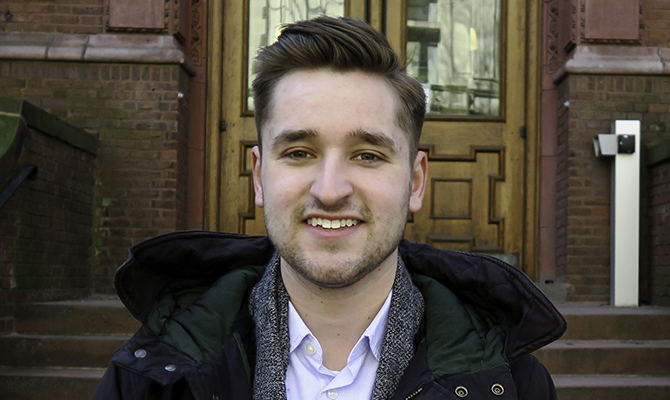
A Penn alum researches sustainable strategies for electric vehicles and municipal energy use
“I knew that if I came to Penn, I would immediately be brought into a network of very intelligent, successful and inspiring people,” recalls Frederik Wouda Kuipers (Master of Environmental Science ’18). An environmental studies major as an undergraduate, Frederik expected to focus on environmental policy as he worked toward a Master of Environmental Studies at Penn. Within a month, he was inspired to change his concentration to sustainability. “The intersection of environmental, social and economic aspects line up more with my ideals,” he reflects. “Environmental change won’t necessarily come from the government—it’s likely that businesses or smaller governments will start the change from the ground up.”
With access to Penn partnerships and resources, Frederik was able to experience sustainable change in action through two transformative internships. With Wharton Small Business Development Center’s Environmental Management Assistance Program, Frederik helped manufacturers in eastern Pennsylvania comply with environmental regulations concerning air quality, energy use and waste management. “It’s a grant-funded program, and essentially free for small businesses to get help and avoid fines,” he says. Frederik also worked as the energy project coordinator for Philadelphia’s Office of Sustainability; assigned to help municipal buildings manage energy use efficiently, Frederik partnered with building managers and contractors to test air quality, improve building insulation, and upgrade facilities such as police stations, fire departments and museums.
As he carried out his part in supporting the City’s sustainability plan, Greenworks Philadelphia, Frederik wanted to address potential energy issues on sites that adopted electric vehicles. “The City has been buying electric fleet vehicles, and plans to purchase more in the future to cut down on air emissions,” Frederik explains. “The sustainability office is trying to lower energy use across the board for every municipal building, but if you install multiple vehicle chargers on one site, its electricity usage goes up.” For his capstone research project, Frederik proposed a plan for managing the City’s electric vehicles efficiently, from strategic procurement and distribution to linking vehicles on an internet network to track usage. His plan is now in the early stages of implementation.
Frederik pictures a future as the chief sustainability officer for a large company or university; in the meantime, he looks forward to additional opportunities to advise and collaborate with growing enterprises. “Environmental consciousness does not have to be difficult or create huge overhead costs for a small business,” says Frederik. “In a lot of ways, sustainability is the smartest and most logical way of going about things. Increased efficiency can lead to lower costs for everyone.”





